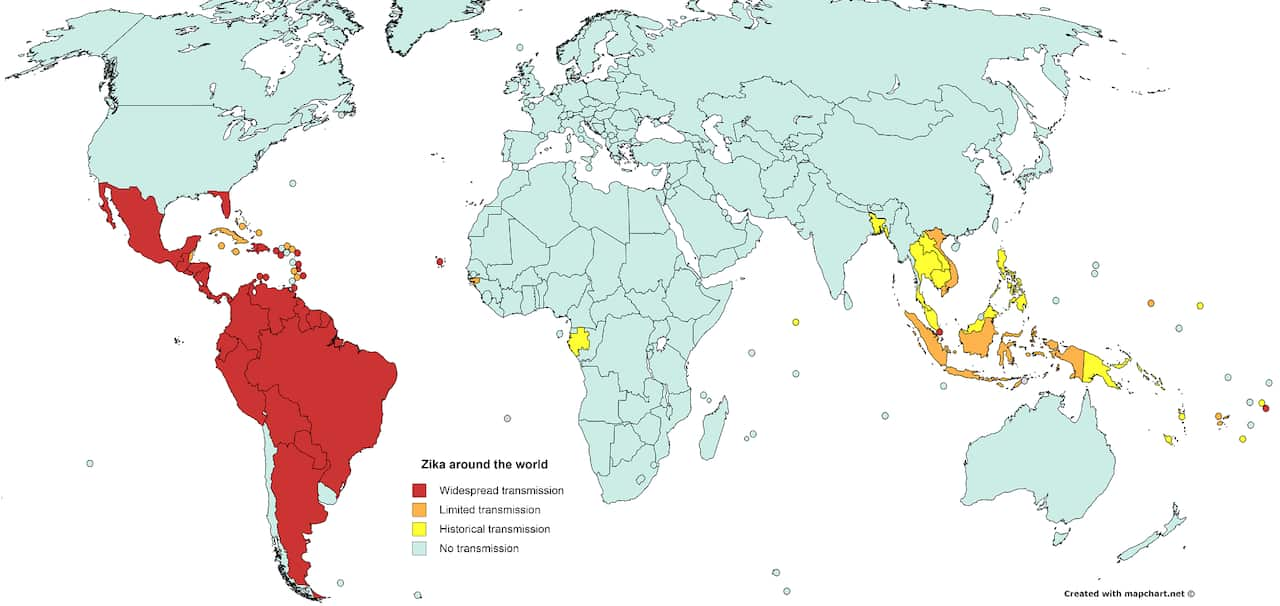Singapore has confirmed its first case of the Zika virus in a pregnant woman. The small Asian nation now has over 100 reported cases of Zika, a number that has been steeply rising since they recorded their first locally transmitted infection earlier this week.
The Australian Department of Health now lists Singapore as one of 36 “high risk” destinations upon “evidence of widespread transmission of Zika virus occurring in the country, increasing the chance that a resident or traveller will be exposed to Zika virus”.
As seen in the map below, Singapore is one of two high risk countries neighbouring Australia, but the majority of others – including Indonesia, Vietnam, Malaysia, Papua New Guinea, New Caledonia and Vanuatu - are listed as either medium or low risk.

The Department of Foreign Affairs and Trade says, “pregnant women should discuss any travel plans with their travel doctor and consider postponing travel to some Zika affected countries,” according to their Smart Traveller website.
A spokesperson from DFAT tells SBS that country specific information can be found on their website, but that their recommendations to reconsider travel are issued with the general population in mind and are not targeted to individual sections of society such as people planning a family or pregnant women.
Zika was declared a global emergency by the World Health Organisation in February this year, 10 months after it was first identified in Brazil in April 2015.
Having originated in Africa, the virus has been found to spread rapidly through the Americas as populations there haven’t built up any immunity.
However, the risk of an outbreak in Australia is considered to be reasonably low, and the focus is on people who are returning from countries affected by Zika.
Zika has the potential to spread in Australia if a person who was infected overseas is bitten by a mosquito of the Aedes aegypti species shortly after their return. In that event, the mosquito would become infected with Zika and be at risk of then infecting other people it bites.
The Aedes mosquito is only found in some parts of Queensland where local authorities are using a strategic plan similar to the one for dengue fever, to combat the threat. There is also low level of risk attached to the sexual transmission of the virus.
The Department of Health tells SBS, "Australia has established measures at all Australian first points of entry to prevent the incursion and establishment of exotic mosquitoes. This includes the requirement for the disinfection of all aircraft arriving in Australia, vector monitoring and control activities at the border, and mandatory treatments of high risk international cargoes to mitigate the risk."
"All travellers should follow recommendations to avoid mosquito bites when travelling in overseas countries where there is a risk of any mosquito-borne disease. This is particularly important if a woman is pregnant or planning pregnancy, in which case it may be more appropriate to defer travel or defer pregnancy."
People returning or recently arrived from Zika affected countries are also subjected to mandatory waiting periods before donating blood.
According to the Australian Red Cross Blood Service, they “currently defer donors who have travelled to countries with mosquito borne agents, such as dengue and malaria, that are a risk to the blood supply.”
“At this stage, all countries affected by Zika outbreaks are already covered by temporary travel deferrals. Our team of blood safety experts will continue to monitor the countries impacted and will make any adjustments to these deferrals as required.”



